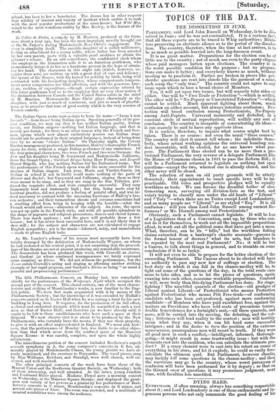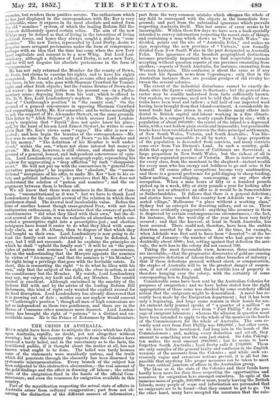DYING HARD.
ErrniusrAsm, if often amusing, always has something
respectabout it ; and Lord Londonderry is one of those enthusiastic and in- genuous persons who not only commands the good feeling of his ale b enemies, but renders them positive service. The enthusiasm which be has just displayed in the correspondence with Mr. Ker is very serviceable, since it exposes in its most absolute and naked form the old " nominee " system, of which the leading Reform Bill Re- formers deliberately spared certain relics. The aim of the new whigs may be defined as that of living in the interstices of living political forces, and hence they always sought a nidus in " com-
The new Tories represented by Lord Derby, desire to promise." disguise more arrogant pretensions under the form of compromise ; perhaps with an idea that the time has come when the new Tory must capitulate and consent to be a new Whig. But Lord Lon- donderry, although n follower of Lord Derby, is not a new Tory, and he will not disguise his absolute pretensions in the form of "compromise."
He has not only returned the Member for the county of Down, de facto, but claims to exercise his rights, and to have his rights recognized. He found a rebel indeed, as some other noble antiqui- ties have, in his son who goes with Sharman Crawford for Tenant- right and other Irish objects ; but the Junius Brutus of Down does not waver : he executes justice on his peccant son—in a Parlia- mentary sense ; deposing him from his seat; which is offered to Mr. D. S. Ker, Lord Londonderry's nephew. The specific offer is that of " Castlereagh's position" in "the county seat." On the ground of a general concurrence in opposing Sharman Crawford and supporting Derby, Mr. Ker consents; and he writes accordingly to ask the support of Mr. Alexander Stewart, on the same grounds. This letter to " Alick Stewart" it is which arouses Lord London- derry's suspicion that " David " does not quite know his place; and, by the hand of his son Lord Ernest Stewart, he writes to com- plain that Mr. Ker's views seem "vague." His offer is now re- peated; and here begin the beauties of the correspondence—Mr. Ker was to come in for the county of Down "as his Member and by his money." "The definition of his Member is well under- stood," writes the son, "where not alone interest but money is given." Mr. Ker, however, is still obtuse, and stands upon the ground of a general, honest, and independent concurrence of opin- ion. Lord Londonderry sends an autograph reply, reproaching his nephew for aggravating a "deep affliction" by such "disappoint- ment." He will not put up with the concurrence in "general Con- servative principles" ; he requires the "absolute," the " uncon- ditional " acceptance of his offer, to make Mr. Ker "heir to his es- tate and political influences "; he perceives that Mr. Ker does not understand the relation of "patron and nominee"; and the en- gagement between them is broken off. We all knew that there were nominees in the House of Com- mons, "unconstitutional as it was ": but we have to thank Lord Londonderry for the explicit avowal of the relation in which those gentlemen stand. The avowal is of incalculable value. Before the time of another honest though crosmgrained Peer, with not less antiquarian enthusiasm it was notorious that the owners of pocket constituencies "did what they liked with their own," but the di- rect avowal of the claim was the reductio ad absurdum which con- verted a prescriptive right into a proscriptive jest ; and election intriguers have found it easier to do what they liked with some- body else's, as at St. Albans, than to dispose of that which they hadas their own. Lord Londonderry is now going to de- fend the family seat most chivalrously : I may be defeated, he says but I will not succumb. And he explains the principles on which he shall "uphold the family seat ": it will be on "the prin- ciples of patron and nominee "• not on any general concurrence, but on the understanding that ihe Marquis appoints the nominee by virtue of "his money," and that the nominee is "his Member"; the right being a privilege that goes with the heritable estate. In short, this is reasserting the right "to do what he likes with his own," only that the subject of the right, the chose in action, is not the constituency but the Member. My watch, Lord Londonderry may say, my carpet, my knife and fork, my Member. The candid avowal is excellent. Although embalmed in the sanctity of the Reform Bill with and by the advice of the leading Reform Bill Reformers, this kind of right only wanted the explicit avowal for its final disruption. Lord Londonderry has already discovered that it is growing out of date : neither son nor nephew would consent to " Castlereagh's position "; though all men of high connexions are not so independent as those two gentlemen, and there are in the House of Commons other nominees more discreet. Lord London- derry has brought the right of " patrons " to a distinct and un- avoidable issue. He is the Prince of Reformers by Misadventure.



























 Previous page
Previous page